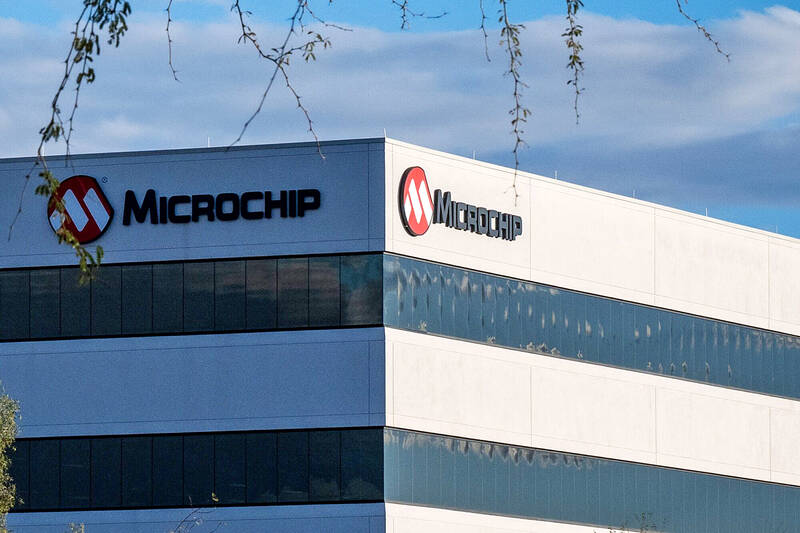Microchip Technology Inc is pausing its application for US semiconductor subsidies, making it the first known company to step back from a program designed to revitalize American chipmaking.
The struggling chipmaker was in line for US$162 million in grants from the CHIPS and Science Act to support plants in Oregon and Colorado. Since then, it has furloughed workers twice at facilities in Oregon and announced plans to shut down a factory in Arizona, affecting around 500 employees.
“I have put the negotiations with the CHIPS office on hold for now,” Microchip chief executive officer Steve Sanghi said on Tuesday at a UBS conference, confirming earlier reporting by Bloomberg. “Probably, by the time I get my arms around it, we’re into the new administration.”

Photo: Bloomberg
Microchip’s decision is a blow to US President Joe Biden’s officials racing to finalize awards from the landmark bipartisan law before president-elect Donald Trump’s return to the White House. The US Department of Commerce, which is in charge of CHIPS Act implementation, has announced preliminary deals with more than 20 companies, and inked final agreements with six — including major players like Intel Corp and Taiwan Semiconductor Manufacturing Co (台積電).
Those binding accords account for almost 50 percent of direct funding from the program, which set aside US$39 billion in grants — plus loans and tax breaks — to boost the US semiconductor industry after decades of production shifting to Asia. US Secretary of Commerce Gina Raimondo has said she wants to finalize as much of that money as possible before leaving office.
“We are in communication with Microchip on their CHIPS process and continue to have productive conversations with them about their long-term plans,” a commerce department spokesperson said in a statement. It is not clear whether the commerce department will reallocate the money set aside for Microchip.
Microchip, which makes older-generation chips for products like cars and consumer devices, has been mired in a deep sales slump and expects revenue to drop 40 percent this year. Its shares are down 27 percent this year, making it one of the worst performers on the Philadelphia Stock Exchange Semiconductor Index.
The company’s decision to pause the CHIPS Act process and shutter its Arizona plant highlights the cyclical nature of the semiconductor industry. The sector’s booms and busts present a challenge for policymakers, who are negotiating investments and subsidies that stretch years into the future.
“The grant was applied to maybe almost a year ago, when everybody thought that the factory capacity was never enough, and the world was gonna build silicon fabs forever,” Sanghi said on Tuesday. “Today, we have too much capacity.”
Meanwhile, CHIPS Act funding also only covers a small slice of factory costs. In order for companies to move forward with projects, the sites have to make commercial sense — something Biden officials have long recognized.
The “government gives you 15 cents of every dollar you spend,” Sanghi said on Tuesday. “Do I want to spend US$100 million to get US$15 million back from the government — if I don’t need it and I don’t want to spend the other 85 myself?”

Vincent Wei led fellow Singaporean farmers around an empty Malaysian plot, laying out plans for a greenhouse and rows of leafy vegetables. What he pitched was not just space for crops, but a lifeline for growers struggling to make ends meet in a city-state with high prices and little vacant land. The future agriculture hub is part of a joint special economic zone launched last year by the two neighbors, expected to cost US$123 million and produce 10,000 tonnes of fresh produce annually. It is attracting Singaporean farmers with promises of cheaper land, labor and energy just over the border.

US actor Matthew McConaughey has filed recordings of his image and voice with US patent authorities to protect them from unauthorized usage by artificial intelligence (AI) platforms, a representative said earlier this week. Several video clips and audio recordings were registered by the commercial arm of the Just Keep Livin’ Foundation, a non-profit created by the Oscar-winning actor and his wife, Camila, according to the US Patent and Trademark Office database. Many artists are increasingly concerned about the uncontrolled use of their image via generative AI since the rollout of ChatGPT and other AI-powered tools. Several US states have adopted

KEEPING UP: The acquisition of a cleanroom in Taiwan would enable Micron to increase production in a market where demand continues to outpace supply, a Micron official said Micron Technology Inc has signed a letter of intent to buy a fabrication site in Taiwan from Powerchip Semiconductor Manufacturing Corp (力積電) for US$1.8 billion to expand its production of memory chips. Micron would take control of the P5 site in Miaoli County’s Tongluo Township (銅鑼) and plans to ramp up DRAM production in phases after the transaction closes in the second quarter, the company said in a statement on Saturday. The acquisition includes an existing 12 inch fab cleanroom of 27,871m2 and would further position Micron to address growing global demand for memory solutions, the company said. Micron expects the transaction to

A proposed billionaires’ tax in California has ignited a political uproar in Silicon Valley, with tech titans threatening to leave the state while California Governor Gavin Newsom of the Democratic Party maneuvers to defeat a levy that he fears would lead to an exodus of wealth. A technology mecca, California has more billionaires than any other US state — a few hundred, by some estimates. About half its personal income tax revenue, a financial backbone in the nearly US$350 billion budget, comes from the top 1 percent of earners. A large healthcare union is attempting to place a proposal before